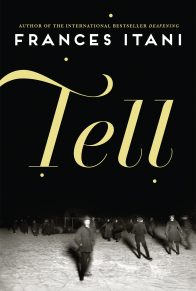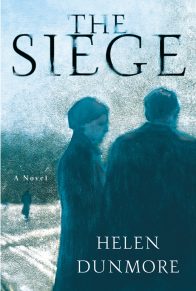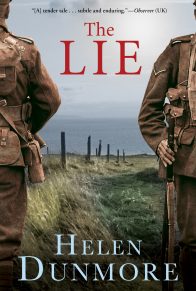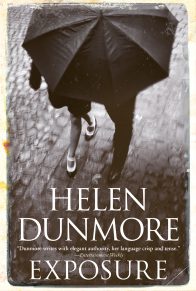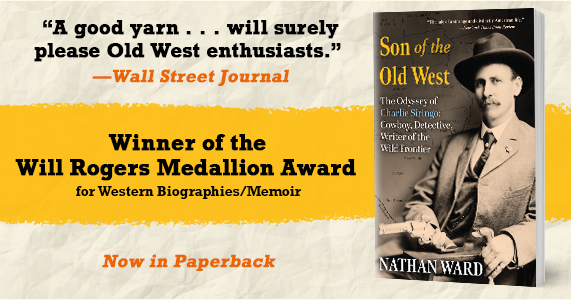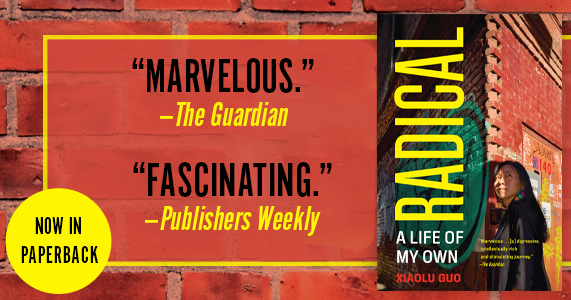It’s a fresh June morning, without a trace of humidity, but Russov is sweating. Sunlight from the hospital corridor’s high window glints on his forehead. Andrei’s attention sharpens. The man is pale, too, and his eyes are pouched with shadow.
It could be a hangover, but Russov rarely drinks more than a single glass of beer. He’s not overweight. A touch of flu then, even though it’s June? Or maybe he needs a check-up. He’s in his mid-forties; the zone of heart disease.
Russov comes close, closer than two people should stand. His breath is in Andrei’s face, and suddenly Andrei stops diagnosing, stops being at a comfortable doctorly distance from the symptoms of a colleague. His skin prickles. His body knows more than his mind does. Russov smells of fear, and his conciliating smile cannot hide it. He wants something, but he is afraid.
“Andrei Mikhailovich . . .”
“Oh, it’s nothing important. Only if you’ve got a moment . . .”
His face is glistening all over now. Drops of sweat are beginning to form.
Suddenly Russov whips out his handkerchief and wipes his forehead as if he were polishing a piece of furniture.
“Excuse me, I’m feeling the heat . . . I don’t know when they’re going to get around to turning off these radiators. You’d think our patients had all been prescribed steam baths.”
The hospital’s radiators are cold.
“I wanted to ask your advice, if you’ve got a moment. As a diagnostician there’s no one whose opinion I respect more.”
Now why is he saying that? Only last week there was an idiotically petty and irritable “professional disagreement” over a little girl with an enlarged spleen following a serious fall. Russov had gone on about “scientific accountability” while he tapped his pen scornfully on the table. He hadn’t appeared very impressed by Andrei’s diagnostic skills then. Andrei always spent far too much time with his patients. This was a clear-cut case of splenic trauma following an abdominal injury. The only question was whether it could be treated non- operatively, or whether an immediate operation was advisable.
When it turned out that the child’s swollen spleen had indeed nothing to do with the accident, and was due to undiagnosed leukaemia, Russov muttered about “flukes” and “all this hands-on mumbo-jumbo.”
But all the same, Russov is a reasonably good physician. Hard-working, responsible and extremely keen to write up as many cases as possible, in the hope of raising his research profile. He’s certainly getting noticed. One day no doubt he’ll produce that definitive research paper which will unlock the door to a paradise of conferences and the golden promise of a trip abroad. Andrei’s gift for diagnosis annoys him. It isn’t classifiable and it hasn’t been achieved in the correct way, through study and examination. The two men have never become friends.
“So what’s the problem, Boris Ivanovich?” asks Andrei.
Russov glances down the corridor. A radiographer is wheeling a trolleyload of X-ray files towards them.
“Let’s go outside for a breath of air.”
The courtyard is large enough to be planted with lime trees and rose bushes. It’s good for the patients to look out and see living things. Andrei remembers the time when they grew vegetables here: onions and carrots and cabbages, rows and rows of them packed together. Every green space in Leningrad became a vegetable plot, that first summer of the siege. Strange how close it still feels, as if those times have such power that they still exist, just out of sight.
These limes are young trees, less than ten years old. The former trees were all chopped up for the hospital stoves in the winter of ’41-2. But the wood ran out at last, no matter how much they scavenged. Andrei’s fingers still remember the icy, barren touch of the unlit stoves.
Two paths run criss-cross through the courtyard. In its centre there’s a circle of gravel, and a bench. Russov remains standing. His feet shift, crunching the gravel, as he takes out a packet of Primas and offers it to Andrei.
“Thank you.”
The business of lighting the cigarettes draws them close. Russov seems calmer now. Although his fingers fumble with the lighter’s catch, they don’t tremble.
“Good to get a breath of fresh air.”
“Yes,” Andrei agrees, “but you’ll have to excuse me in a minute. I have a patient going into X-ray at two, and I need a word with the radiographer first . . .”
“Of course. This won’t take a moment.”
But still he won’t come to the point. Just keeps on dragging at his cigarette and blowing out jerky puffs, like a boy who is smoking for the first time. Like Kolya.
“It’s a new patient. A tricky case.”
Andrei nods. “Would you like me to take a look?”
Russov’s face twitches into a smile. “It’s not a question of diagnosis precisely,” he says, with an attempt at his usual manner of lofty certainty, “but of defining exactly what tests ought to be carried out at this stage.”
“So what are the symptoms?”
“In a case such as this . . . Well, in such a case one needs to be a hundred per cent certain before one takes the next step.”
“I’m not sure I understand you. What are your initial findings?”
Russov gives a sudden harsh bark of laughter which transforms his face completely. He looks almost savage. His short hair seems to bristle.
“My ‘initial findings’ are that this patient is the son of . . . of an extremely influential person.”
“Ah. And how old is the boy?”
“Ten.”
“And so it’s a joint problem, is it? Is that why you’ve come to me?” Why doesn’t Russov get to the point?
“He’s Volkov’s son,” says Russov abruptly.
“Volkov’s?” My God. It’s one of those names you only have to say once, like Yezhov or Beria. Andrei’s heart thuds, and he has to clear his throat before speaking. “The Volkov, you mean?”
Russov just nods, and then rushes on. “A joint problem, yes, I’m pretty sure that’s what it is. There’s swelling and redness and so on, pain on articulation, heat to the touch. That’s why I’ve come to you. All the symptoms point to juvenile arthritis and you’re the man for that. I haven’t ordered tests yet, it’s pure guesswork,” he adds hastily.
“You’d like me to take a look.”
“If you would. If you would, my dear chap, I tell you, I’d be eternally grateful.”
My dear chap? Eternally grateful? Sweat is still leaking from the pores of dry, competent Russov. He never talks like this. What the hell is going on?
The breeze is warm and sweet, but ice touches Andrei. There’s much more here than he’s being told. Russov fears that this child is seriously ill. He wants Andrei to see the boy, take on the case, order the tests and then give the verdict to the family. Russov will do anything not to be the bearer of bad news to Volkov. It won’t be Russov’s face that Volkov will remember with the cold, hard rage that such a man will feel for anything he can’t control.
Russov drops his cigarette butt, grinds it into the path and then smoothes clean gravel over the spot with his heel. Andrei says nothing. He finds himself staring at the lime leaves as if he’s never seen them before. They are so fresh and vigorous. Amazing how trees always look as if they’ve been there for ever, even when you can remember the women stamping down earth over their bare roots.
Russov clears his throat. “It struck me as just possible that there might be something I’ve overlooked. There’s a risk of setting off in the wrong direction . . . ordering the wrong tests, for instance. In a case of such significance for . . . for the hospital, we can’t afford any margin of error.” And he actually has the nerve to look at Andrei self-righteously, as if Andrei is the one who has neglected to think about the greater good of the hospital community. Andrei stares back blankly. Russov’s eyes drop. “For example . . .” he mumbles. “For example, you’ll recall the little girl with the spleen.”
How the man is abasing himself. He will hate Andrei for it afterwards, once all this is over. No one makes a better enemy than a man who has had to beg for your help.
But perhaps Russov really has missed something. He’s thorough, but he goes by the book. It’s also just conceivable that he’s aware of this—that he’s not as self-satisfied as he always seems—n which case he might be doing exactly what ought to be done in such a case: seeking a second opinion.
“You still haven’t told me anything about this child,” says Andrei.
Another throat-clearing. Russov’s hand strays to his jacket pocket, where he keeps his cigarettes, and then falls to his side. His eyes stare into Andrei’s, but remain opaque.
“My thinking was that it would be best for you to come to the case quite fresh.”
A rising breeze makes the lime trees shiver all over. Hold back, thinks Andrei. Don’t commit yourself. Not instantly, like this. He recognizes it already as one of those moments that has the power to change everything. Perhaps he won’t be able to avoid it. If you put everything else aside, there’s still a sick child here, and he needs the best possible treatment. What if Russov gets it wrong again?
But Andrei has Anna to think of, and Kolya.
Their faces rise up in his mind, oblivious. There’s a knot of tiny lines on Anna’s forehead, but when she looks up and sees him that knot will clear. And there is Kolya, tall and thin, narrow-shouldered because he hasn’t grown into his height yet. Kolya frowning at his homework, then suddenly jumping up and crashing across the living room because he’s spotted a mouse under the table. Or claims he’s spotted one . . . Kolya wants a cat, and Anna isn’t keen.
Kolya, lunging between child and man, and out of step with both.
Andrei’s heart beats hard. Whatever happens, these two mustn’t be touched.
But Russov didn’t want any of this, either. He’s just a trapped, ordinary man. Reasonably competent, reasonably conscientious. And now quite reasonably afraid.
“So, you’ll see the boy?” asks Russov.
“Have you got the case notes with you?”
His colleague hesitates.
“It was just a preliminary examination, you understand. I’ve done no tests. There’s been no possibility of making any sort of diagnosis. The boy was brought in last night with certain symptoms, that’s all. By private ambulance,” he adds, as if this hopelessly irrelevant detail will make up for all the blanks.
In a flash, Andrei does understand. The bare minimum has been put into writing.
“But you must have ordered tests. You must have thought about what would be needed.”
“I don’t want to prejudice your own examination.”
Andrei feels himself recoil. Even here, out in the courtyard where surely nobody can be listening, his so-called colleague won’t talk. He’s studied hard all right, in the unwritten subject that runs through every other course of study. Keep your tongue and your hands still, unless you are absolutely sure that it’s safe to move them. Don’t take risks. Don’t stand out. Be anonymous and average; keep in step
“It was Doctor B. I. Russov, of course, who made the initial examination and first suggested the diagnosis that was later confirmed . . .” He’ll do anything to avoid that. Much better for Russov to be able to say: “I asked a colleague—a first-rate general paediatric physician and one of our finest diagnosticians—if he would examine the patient. Dr Alekseyev has a particular interest in juvenile arthritic disease, and given that my own caseload does not permit me to take the special interest in this case which it requires, it seemed the best course of action to hand over the case as soon as possible. Consistency of care, you understand, is of the utmost importance.”
That’s how it will be.
What does Russov take me for? Does he think I’m a complete idiot?
Russov looks down at the gravel. His shoulders sag. He thinks he’s lost, thinks Andrei. He thinks I’m going to tell him to sod off. And of course that’s what I’ve got to do. Let Russov carry his own can. He’s always trying to make himself conspicuous, and now fate has found a way. He’ll “raise his profile” with Volkov all right . . .
Russov got the case. That’s all the difference there is between us.
>He could say yes. That’s what he always says. Andrei has never been one of those doctors who keep their expertise only for their own patients. He doesn’t spare his energy either. Sometimes it seems that the more he uses up his energy, the more he has, as if he’s got access to some secret principle of acceleration that overrides the normal rules of fatigue.
Everybody knows they can count on Andrei. Russov will be counting on that.
“You want me to take on the case,” says Andrei.
“I didn’t say that.”
“Listen, Boris Ivanovich . . .”
“I’m only asking you to take a look at the boy.”
“Not today. It’s impossible. I’ve got two clinics, and then a meeting until nine.”
“But you will?”
“I can’t promise. I’ve got to go, my patient is waiting, and the radiographer. I’ll speak to you tomorrow.”
Russov puts a hand on Andrei’s sleeve. Shadows flicker on the dusty brownish-grey cloth. “I appreciate your cooperation,” he says. He wants to sound as a man should sound after a normal professional discussion with a colleague, but in spite of himself his voice pleads.
“These trees have done well,” says Andrei.
Russov looks up impatiently. Trees! For heaven’s sake, aren’t there more important things to talk about? His grip tightens on Andrei’s arm, then he recalls himself, and says with forced civility, “splendid things, trees.”
Anna worked from first light to darkness on the big October tree-planting day, the year the war ended, Andrei remembers. He didn’t take part, because he was on duty all day. She came home exhausted—she had certainly “fulfilled her norm of unpaid labour”. He was annoyed with her for doing so much . . . all that slog on top of a week’s work. Surely she could have come home earlier, look at her, she was going to make herself ill. But Anna said, “It’s trees, Andryusha. Something for the children. Just think, one day Kolya will be able to take his children out to the new parks and walk under the shade of the trees we’ve planted today.”
Andrei walks down the corridor towards the Radiology Department. He can feel the tension in the back of his neck. He pauses for a moment, drops his shoulders, rotates them, lets them fall. Sick children are very quick to spot signs of adult anxiety.
“Hello, Tanichka, how’s Mama behaving herself today?”
Tanya and her mother both laugh. It’s an old joke between them. Tanya’s mother used to scuttle in and out of the hospital, head down, terrified of breaking imaginary rules, terrified that Tanya would show her up. On one occasion all her fears came true when Tanya couldn’t get to the toilet in time and wet herself, right there on the floor. But they’ve all got to know one another now. Just as well, since Tanya has had to be hospitalized several times with acute attacks. There is a new treatment based on extracts from animal adrenal glands, but he thinks it is still too risky for Tanya, given her weight and generally poor condition.
“You remember how I told you, Tanya, that your joint mobility depends on you too now, not just on the doctors and nurses? How have those exercises been going?”
Andrei has prescribed a course of isometric and isotonic exercise for Tanya, plus massages.
“Very well, doctor, she’s been doing her exercises every morning and every evening, just like you said,” Tanya’s mother answers.
“Even when they hurt I do them,” says Tanya proudly.
“That’s right. Remember what I told you, it may hurt but it will never harm you. You’re not putting any weight on your knees, you see. You’re just helping them to learn how to move again. And how about the cod liver oil?”
“She takes it every day, good as gold, don’t you, Tanya?”
What he’d really like to do is send Tanya to a sanatorium that specializes in arthritis. There’s no father: dead in the war, like so many of his children’s fathers. Probably never even saw his daughter. The mother is from Kingisepp originally, but she and all her family fled east as the Germans advanced, and were sent on to the Urals. Tanya and her mother must have returned as part of Leningrad’s post-war influx. And now Tanya’s seven, and her mother works in a tailoring shop. Their chance of a ticket to a children’s sanatorium looks slim, but it’s still worth pursuing.
“And you’ve kept all the physiotherapy appointments?”
Tanya’s mother can manage these hospital visits, but each physiotherapy session means that her own mother, who went back to live in Kingisepp, must travel to Leningrad, stay over and take Tanya to the clinic.
“She’d live with me if it would help, but in a communal apartment like ours it’s not really possible. Our room is very small. And besides, she grows vegetables, and that’s how I get extra eggs and milk for Tanya.”
“Yes, Tanya’s been to her appointments as regular as clockwork,” says her mother with pride. “She’s never missed a single one.”
“That’s really excellent,” says Andrei warmly. “Now, please wait just a moment while I have a quick word with the radiographer. Tanya, I’m going to ask Sofya Vasilievna to look especially carefully today.”
He spends too long with patients. He talks to them too much. He’s been criticized for it, but he points out in his defence that in the long term his approach is efficient. It enables him to spot problems as they develop, or even before. He achieves “exceptionally high levels of patient compliance with treatment”, which is certainly something that can be ticked off on the targets. It’s not all “yes doctor no doctor” and then go home and swallow some decoction their grandmas swear by, and not bother with the exercises because the poor little thing is sick, isn’t she, so what’s the good of wearing her out?
Also, Andrei believes that children want to know far more than we think they do. They get less frightened that way. He has known children close to death who have understood it in a strangely matter-of-fact way, but have suffered because their parents, in grief and terror, refused to acknowledge what was happening.
He’s on his way up to the ward when someone behind him calls his name. He turns. “Lena! Sorry, I’m in a rush . . .”
She’s panting, and her face is flushed. She must have run after him. “I saw you coming out of Radiology.”
“Is everything all right?”
“I’ve got to talk to you. It’s important. It’ll only take a minute.”
“What’s wrong?”
She glances up and down the corridor, puts a hand on his arm and steers him a few metres away from the half-open door to their left.
“You were in the courtyard with Russov.”
“Yes?”
“It’s about the boy who came in last night, isn’t it? He’s in a private room, but Lyuba saw the name. What’s going on? Don’t for God’s sake let Russov drag you into this.”
“Lena, is it true that this is Volkov’s boy?”
Again that quick look up and down the corridor. “Yes. They say it’s the only child.”
Andrei feels a plunge in his stomach, as if he were standing on a cliff and had suddenly looked down.
“He was, wasn’t he?” asks Lena.
“What?”
“Russov. Trying to dump the case on you. It’s so typical . . .”
“I suppose we can’t blame him, Lena. If we were in his shoes . . .”
“You soon will be, if he has his way. And he’ll be out of them.” Lena’s clever, slanting green eyes scan his face anxiously. “You’ve never agreed?”
“I’ve said I’ll talk to him tomorrow.”
“Listen to me. I know about these things. Tomorrow you’ll call in sick. Promise me.”
“I can’t do that.”
“Do you think Russov would do anything for you if you were in his position?”
“No. Probably not.”
“Well, then.”
“But, Lena, we’re medics; we have to cooperate. It’s perfectly legitimate for Russov to call on a second opinion.”
“Is that what he calls it? He’s going to be the first opinion, then?”
“Well . . .”
“Just as I thought. It’ll be you in the firing line, and no one else.” She lowers her voice again. “You should keep out of it. Remember Court of Honour.”
Of course he had seen the film. He and Anna had watched it in silence, and left the cinema without comment. She had held his arm very tightly on the walk home. The film was fiction, but its targets were real.
Kliueva, Roskin and Vasili Parin. Brilliant, innovative research scientists. Kliueva and Roskin pioneered biological drug treatments to shrink tumours. They’d seemed invulnerable. State funds poured into their research institute. Kliueva was awarded a Stalin Prize.
The charges brought against them were that they’d betrayed Soviet scientific research secrets, which belonged to the State. Either they’d been tricked by the Americans into disclosure, or there was a more sinister explanation. But everyone knew it was inconceivable that they’d made these contacts with the Americans without permission. No scientist travelled to the USA without a full and thoroughly understood set of instructions. Whispers said that everything was done on clear State orders. Policy had changed overnight, as it did so often, and the scientists paid the price. Parin, who’d actually handed over the research material, was sentenced to twenty-five years as a spy for the Americans. Somehow, by the skin of their teeth, Roskin and Kliueva survived their Court of Honour, their severe reprimand and the barrage of claims that they too were spies, hoodwinked by the Americans.
They’d been unbelievably lucky; Parin not so. The warning was there. Don’t think, however eminent and crowned with prizes you may be, that you can’t be destroyed. Don’t think that the scientific or medical community can expect any special favours because of its particular expertise. The same stringent standards apply to everyone. Scientists can be spies; doctors can be anti-patriotic saboteurs. Anybody can go out of favour in the blink of an eye. The State is tire less in exercising the utmost vigilance over scientists and doctors who present themselves as “dogooders,” thinking only of the needs of humanity and of their patients.
Lena is watching him. She’ll know exactly what he’s thinking. Everyone saw Court of Honour. She glances around her again, and says very quietly, “I know it’s not quite the same thing, but it’ll turn out the same way, believe me. They believed that they were acting in good faith and so they would be all right. All they were thinking about was the cure. That was their mistake.”
He nods. Not for the first time, he’s amazed by Lena’s trust in him. “I understand what you’re saying, Lena,” he answers.
“Do you? I hope so. You’ve got too much faith in people, but to me all this smells wrong. Did he tell you what’s wrong with the boy?”
“Not yet. What do you know, Lena?”
“Not a lot. No one’s been allowed near him except Russov. He’s had X-rays done already, did he tell you that?”
A wave of anger courses through Andrei. How can that be possible? To have X-rays done, but not to tell him! Was Andrei supposed to order more X-rays and so give the patient a double dose of radiation?
“Retinskaya did the X-rays out of hours,” says Lena, naming a radiographer who is new to the department and whom Andrei scarcely knows. ‘she’s like that with Russov.”
“Lena, how do you know all these things?”
“Because I’ve got kids. There’s only me to look after them, and so I have to know things. Listen, we’ve been talking too long. Promise me you won’t go in for any heroics. A man like Volkov, you don’t want him even to know your name. You just have to not be here, that’s all it’ll take. Call in sick tomorrow.”
The children. Yes, Lena has two children. And no husband, like so many. Andrei never knew him, because Lena’s not a Leningrader. She’s a Muscovite who moved here after the war. Her husband was a prisoner of war and he died in a German camp. He left behind a girl who must be fourteen now, tall, with long plaits, and a boy a year or so younger. Both of them are much fairer than Lena, and the girl is as slender as a willow, quite different from her dark, stocky mother. The dead man moves inside them like a shadow, in the turn of a head or the gesture of a hand.
Anna has always liked Lena. Kolya likes the girl, too: Vava.
Call in sick! If only he could. Anna could call in sick too—a double miracle—and they’d take their bikes and some bread and sausage and cycle out to the dacha for the day. Kolya would be at school, so it would be a real holiday, just the two of them. He’d repair the shutters, and Anna would dig the vegetable garden and then make tea.
But Russov must be crazy to take such a risk with the X-rays. It’s inconceivable that he’s simply destroyed them. There must be a record.
Crazy, or very, very frightened. What can those X-rays have shown?
If it’s some form of juvenile arthritic disease, then it’s legitimate—or at least, semi-legitimate—to shunt the case on to Andrei. Everyone in the hospital knows he runs two JA clinics a week. But X-rays reveal many things . . .
He fights down an urge to find Russov and shake him until he disgorges every bit of information he’s got. Let’s see if he dares to lie about those X-rays when Andrei’s hands are around his throat!
Russov would still lie. What’s he got to lose by it? And the radiographer, what’s her name, she’ll lie too. They’ll have calculated that the worst that could happen is that the child might remember being X-rayed; but no one takes much notice of what children say.
Another wave passes through him, but this time it’s revulsion rather than anger. The child, in the middle of all this, not suspecting a thing. He’s been told what doctors are for: doctors are there to make you better. What have we come to, thinks Andrei, when our patients can make us ashamed of ourselves.
Call in sick . . . An attack of flu, even though it’s midsummer. He can smell the earth as Anna pulls weeds from between her rows of carrots. The soil will be moist after all this rain. The weeds will come out easily, and Anna will throw them on to a heap to wilt and die.
He blinks. The blob of sun on the corridor wall wavers. The day shines before him, impossibly ordinary and beautiful. This must be how the dead think of life. All those things they used to take for granted, and can never have again.
>He is no brilliant Roskin. He’s never likely to be offered trips to America, or the chance to be bamboozled by American spies posing as disinterested fellow researchers who care for nothing but the good of humanity. He’s just an ordinary doctor; a good one, it would be false modesty not to recognize that, but still . . . just a doctor.
That’s all he wants; no more, but no less. He wants to live out an ordinary, valuable life. He wants Anna, and their life together, and Kolya too, maddening as Kolya so often is. He wants to come into work early and smile as he passes a colleague in the corridor, with her arms full of files.
“Busy day?”
“Yes, isn’t it always?”
He wants to sit in his vest by the wide-open window on the first warm day of spring, drinking a beer, with Anna somewhere in the room behind him, sorting the little brown envelopes of seeds she’s saved from last summer. Each envelope is labelled in her beautiful slanted handwriting. She has what he always thinks of as “an artist’s hand”. His own writing is cramped and hard to read. But they’ve never needed to send each other letters, because they’ve always been together.
That child in his private room doesn’t know it and can’t help it, but he carries a disease that destroys ordinary life as fast as the plague corrupts a living body. His father is high up in the Ministry for State Security, and he has one of those names that is spoken only in whispers: Volkov.




